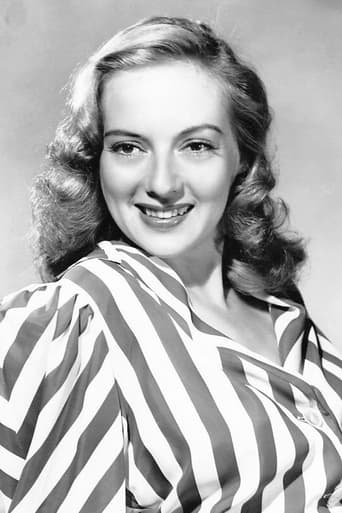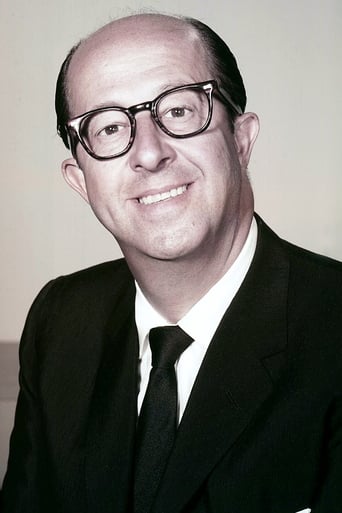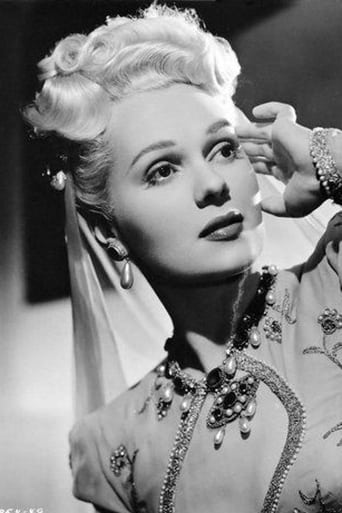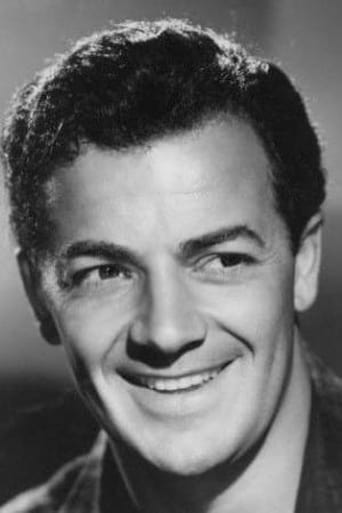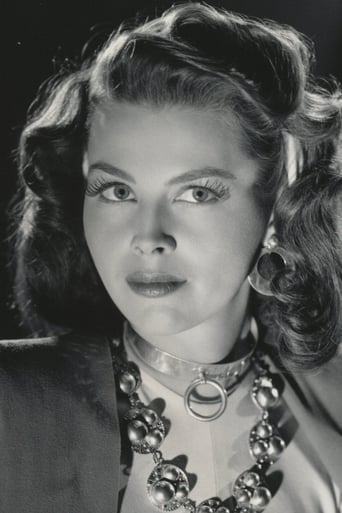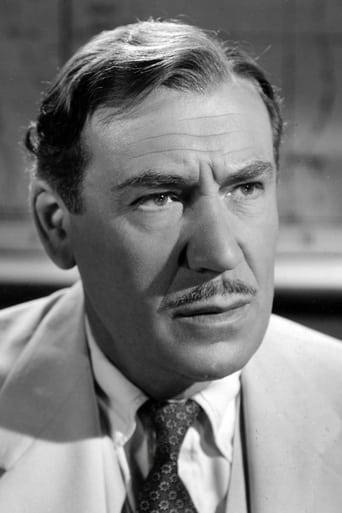BootDigest
Such a frustrating disappointment
Cleveronix
A different way of telling a story
Rexanne
It’s sentimental, ridiculously long and only occasionally funny
zardoz-13
Bespectacled comedian Phil Silvers and flirtatious genie Evelyn Keyes steal the show in the Alfred E. Green romantic, tongue-in-cheek,Arabian fantasy "A Thousand and One Nights," a gorgeous Technicolored Columbia Pictures release that teems with anachronisms galore. Basically, the Phil Silvers character wears the right clothes but his dialogue bristles with 1940s slang, such as the use of the word groovy. Green, who helmed "The Green Goddess" as well as the Barbara Stanwyck classic "Baby Face," keeps the action breezing along and the atmosphere light-hearted. The leading man, Aladdin of Cathay (youthful, Hungarian-born Cornel Wilde of "High Sierra"), spots a caravan entering the city with an elegant litter and steals within the contraption to feast his eyes upon the lovely daughter of the Kamar Al-Kir, Princess Armina (Adele Jergens of "Armored Car Robbery"), and he falls in love with her. Not surprisingly, she shares his affections. Later, Aladdin and his wise-cracking, pick-pocket thief sidekick, Abdullah (Phil Silvers of "All Through the Night"), are dispatched to find a lantern in a cave by a sorcerer who tries to cheat them out of it. Aladdin discovers that when he rubs the lantern, a genie named Babs (Evelyn Keyes of GONE WITH THE WIND) appears to grant him a wish. The circumstances under which Aladdin makes this discovery is when he refuses to give the sorcerer the lantern after he has trapped them in a cave. Early, our heroes had to elude Meanwhile, the villainous twin brother of the Sultan, Prince Hadji (Denis Hoey of "Uncertain Glory"), persuades the Grand Wazir AbuHassan (Philip Van Zandt of "House of Frankenstein") to join him and remain mum about his masquerade. They imprison the real Sultan in another of his palaces far away.but the evil twin brother overlooks a wound that brother acquired later that he did not know about. When they catch Aladdin flirting with Princess Armina, they imprison him, but Abdullah and he manage to escape through the intervention of the hand-maiden of the princess who slips them the keys to their cell while the guards are playing gin rummy. Aladdin persuades Babs to transform him into a noble man because Arminia is not allowed to marry below her station in life. Mind you, all this time Babs has a terrific crush on Aladdin and does everything that she can to dissuade him from marrying the princess. Eventually, Babs pulls a prank that robs Aladdin of her and he loses everything and is exposed. The fake Sultan orders both of them hanged, but Arminia promises to marry the Grand Wizir in exchange for him turning them loose. This prompts Aladdin to warble a misogynist song in the equivalent of an Arabian saloon while Abdullah contrives his own song where he describes all the women that he loves, including gay women. Clearly, gay in this instance did not refer to lesbians or the repressive Production Code Adminstration would have forced Columbia to remove it from the screenplay. Aladdin gets to swash and buckle in the last half-hour with the fake Sultan as they have a sword fight. For the record, Wilde was a member of the 1936 U.S. Olympic fencing team so he knew how to handle foils. The ending is a slick trick and the writing is above-average, except in one instance where are hero is sent on a wild goose chase to get the lantern after it is thrown out the window.Scenarists Richard English, Jack Henley and Wilfred H. Petitt penned the lively screenplay that stipulates that anybody who uses the genie must retain the lantern if they want to maintain the changes in their respective lifestyle. If you lose the lantern, you loose everything that you received from the genie. Further, only the individual who rubs the lamp can see the genie. The genie, who likes to be called Babs, not only creates an army for the impostor but also makes him a man high enough in status so that he is allowed to see her. Lots of fun, especially Rex Ingram as a giant who menaces the heroes during their initial search for the lantern.
MARIO GAUCI
Although the Arabian Nights Technicolor fantasies of the 1940s and 1950s were mainly the domain of Universal Studios, the other Hollywood majors understandably jumped on the Oriental band wagon while it was big box-office, and this endearingly modernistic revamp of the mythical tale of Aladdin was Columbia's contribution to that WWII craze. Having first (and only) read about this one on Leonard Maltin's Film Guide and never encountering it on Italian TV in my childhood, I leapt at the chance of acquiring it on DivX but, as is becoming increasingly (and frustratingly) regular with this format, there were lip-synch problems which, thankfully, were corrected via conversion to DVD. But, enough of this techno-babble… Aladdin is played by Columbia's star Cornel Wilde – he had just been Oscar-nominated for A SONG TO REMEMBER (1945) – who is curiously fourth-billed here; he even gets to sing several times (a talent of his that I had previously been unaware of…if that was indeed his voice on the soundtrack); incidentally, I should be acquiring another somewhat obscure Wilde costumer very soon called STAR OF India (1954) which I intend to watch over the Christmas week. As I said in my introduction (and perhaps to differentiate itself from the rival Universal product), the film-makers also engaged the services of another currently hot commodity in bespectacled comedian Phil Silvers as Aladdin's pickpocketing sidekick. At first, I balked at his modern-day savvy personality (with in-jokes towards The Lone Ranger, liberal use of hip words like "groovy", etc.) but was eventually won over by his gauche schtick culminating in his hilarious Frank Sinatra transformation at the film's very end. Another asset to the film is the delightful (if belated) presence – as a mischievous female genie of the proverbial lamp – of the late (she died earlier this year aged 91!) Evelyn Keyes; naturally, she falls in love with her master Aladdin but, losing him to Princess Adele Jergens, she creates her own clone!Speaking of the Universal rivalry, I was surprised to see Dennis Hoey (best-known as the bumbling Inspector Lestrade of Universal's ongoing Sherlock Holmes series with Basil Rathbone and Nigel Bruce) in a dual rule as the villain, not to mention Rex Ingram reprising (albeit too briefly) his celebrated giant characterization from THE THIEF OF BAGDAD (1940)! Like its prototype ARABIAN NIGHTS (1942), this film was also looked on favorably by Academy Award voters in the technical categories: art direction-set decoration and special effects (mostly having to do with Silvers being unable to see Keyes and Wilde's transformation into a dog – another nod, I suppose, to that afore-mentioned Alexander Korda production).
holly
Big colorful sets and fantasy costumes are featured in this hokey update to Alladin's Lamp that never takes itself seriously. Evelyn Keyes is adorable as the genie that no one but handsome Cornel Wilde can see, but he has eyes only for Adele Jergens as the blonde princess. Sidekick Phil Silvers has his eyes on every jewel in the palace. Of course there's a scheming Vizir and a Sultan switcharoo. A thief masquerades as a prince, and just about every other Arabian Nights cliché is given some sort of send up.Most of the comedy involves one of the secondary characters turning to the camera and saying something modern while the leads play it straight. Subplots (and villains) are invented then abruptly dropped, and cultural awareness seems unknown in 1940s Hollywood. If this sort of thing makes you cringe you will hate this film, but if you like pretty musical comedy in gorgeous Technicolor there's a lot here to like! The Princess is carried in a royal blue litter that matches her dress, and her bed is draped in sumptuous curtains the same color as her lilac gown. Harem girls flutter in pastels, and the brightly colored see-thru veils they use to cover their faces is merrily naive. Set pieces are few and far between but fabulous, and every other scene seems to take place on an ornate balcony. An authentic looking dance is a welcome distraction, and Silvers and Wilde share a bar sing-along about women (one for romance, the other against) that is campy fun.By the end it feels over-sweet like you've swallowed too much cake icing, but it moves along quickly and there's a happy ending for everyone even the genie. This film is in the same vein as Marlene Dietrich's version of KISMET (1944), which I highly recommend for its pastel harems and anachronistic Baghdad that never was.
MartinHafer
This is the sort of silly adventure film that, unfortunately, they just don't make any more. And to top it off, the film's sense of humor and fun is so pronounced that it's hard not to like the movie. In many ways, the film is the obvious inspiration for Disney's ALADDIN as well as inspired by Bob Hope and Bing Crosby's "Road Films". An apt title for the film might have been "Road to Arabia".So how can I say it's like a Road Film? Well, even though the actors and studio are different, the chemistry and dialog is identical. Phil Silvers plays a part highly reminiscent of Bob Hope, as he plays a snappy-talking anachronistic 1940s jive-talker set in the 9th century. He was simply wonderful in this role--probably the best film part he ever did. Cornell Wilde is much like a more handsome version of Bing Crosby because he very ably croons throughout the film and is the one who eventually gets the girl. The chemistry and plot outline is pure "Road"--such as ROAD TO MOROCCO or any of the other Hope-Crosby films except it's a better--probably due to better writing and production values.So how is it like ALADDIN? Well, Cornell Wilde actually plays Aladdin and much of the story is what is later replicated in the Disney film--the evil sorcerer Jafar and the plot to steal the throne and the romance between a princess and a poor young man are all there. And, in many ways, Phil Silvers is the sidekick who was later replaced by the monkey, Abu! And, finally, the genie is the fast-talking and smart-allecky character it was in the later film except it is played by a lady (Evelyn Keyes) and she, too, is in love with Aladdin. I absolutely loved Miss Keyes in the film (more than I liked Robin Williams as the genie) and really couldn't understand why Cornell didn't pick her instead of the lovely princess (Adele Jergens).The bottom line is this movie is just lots and lots of fun. Plus, the humorous and anachronistic lines were actually funny and made me chuckle. This is a must-see for fans of adventure films and I'm glad I saw it. I could easily have scored the movie a 9--it was that good.By the way, the dual roles of the Sultan and his evil twin were played by Dennis Hoey. He's the same guy who played the recurring role of Inspector Lestrade in the Sherlock Holmes series of the 1940s and it was nice to see him in a different sort of role.
